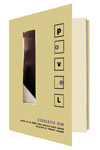In aesthetic and attitude, Geraldine Kim’s debut, Povel, aligns itself with Lisa Carver’s seminal zine, Rollerderby. To make the comparison a better fit, take lefty scissors to Carver’s back catalogue and paste its juiciest parts onto Lyn Hejinian’s My Life. Kim might not know Carver—according to her press bio, she was born in 1983—but she has anticipated the My Life linkage, appending a faux Hejinian intro to the work that defines Povel as an invented form blending “poetic and novelistic aspects.” Writing under the guise of the Language Poetry queen, she continues her intro: “When asked to choose which genre would apply ‘better’ to her povel-text, Kim promptly threw a lemon meringue pie in my face.”
That flippant pie toss at the old-guard nails Kim, a self-described “mixture of pop culture and romance” who’s armed with a quicksilver mind given to glorious one-liners. She wants “to be taken seriously. Like a dead rapper’s unreleased tracks,” and when asked about her sexual orientation, she thinks to respond, “Visually oriented.” Beyond Hejinian’s walk-on, Kim lifts Jim Carrey’s Golden Globes acceptance speech for her own purposes, crams Nick Nolte’s messy-haired mug shot into her endnotes, and appropriates George W. Bush’s biographical blurb (collaging her mug over the Prez’s in a photo of W. chilling with Laura). Kim was voted class clown in high school and brandishes postpunk chutzpah, but hey, don’t mention Margaret Cho. (When friends do, Kim claims “Yeah because I’m the other Korean chick that speaks English.”)
Soundtracked by Rage Against the Machine, Mindless Self Indulgence, and At the Drive-In, Povel’s a fractured time capsule concocted to replace the one she lost after burying it in first grade. In the text, she tells her ex the book’s chronological. An average passage: “I should wear gloves. ‘Are you guys done tomorrow?’ she says. After I planted a tree in our friend yard, it died. Then my brother planted a tree in the same spot and it thrived.” Despite the playful nonlinearity, her claim doesn’t feel like a bluff: Povel’s characters gain significance through each walk-on and eventually even the smallest echoes feel huge (she returns a book by Gaddis to the library and JR casts a shadow across the next stanza/graph). The most emotionally fragile moments explore the relationship between Kim and her ex’s mother (both refuse to let go) and various hijinks with her Madden-playing brother, whom she thinks would make a better boyfriend than most other folks she comes across. (Things are less rosy with her chipped-tooth parents—her father’s given to smacking her in the head—and a somewhat shadowy sister.)
Others caught in Povel’s orbit include a poetry workshop (one character disses Povel as “willy nilly”; another sees it as an attempt at “shock value,” though he wants to chill with her after she submits her “sex cycle poems”), an NYU-area pamphleteer, a cute guy in her poetry class, and best of all, the “Sarcastic Starbucks Guy named Fish.” (She allows her dialogue to exist outside of Povel’s pages, too, leaving graffiti clues on NYU’s campus with footnotes telling the reader where to locate her messages.)
Ultimately, the most important character’s the author herself. Kim thinks obelisks and fingers resemble penises and hopes for a ménage-à-trois with Woody Allen and David Foster Wallace (“a self-conscious/neurotic orgy”). Displaying Ackerian bravado, she meditates on “how cool it would be to have sex with a dolphin” as well as inventing a wall of glory holes and a “drinking-straw apparatus” so she can “give [herself] head.” All this firecracker sex talk’s mixed with a dose of smart-ass self-deprecation (she believes she possesses “the IQ of a small shellfish”) and a cocksure gamesmanship (see Hejinian intro, for example). Battling a caffeine addiction and grammar check, her project itself is a race against time: more or less, she’s a mosh pit–friendly Proust dipping madeleines in soy chai, finding a way of translating her life into words “before it goes away.”





